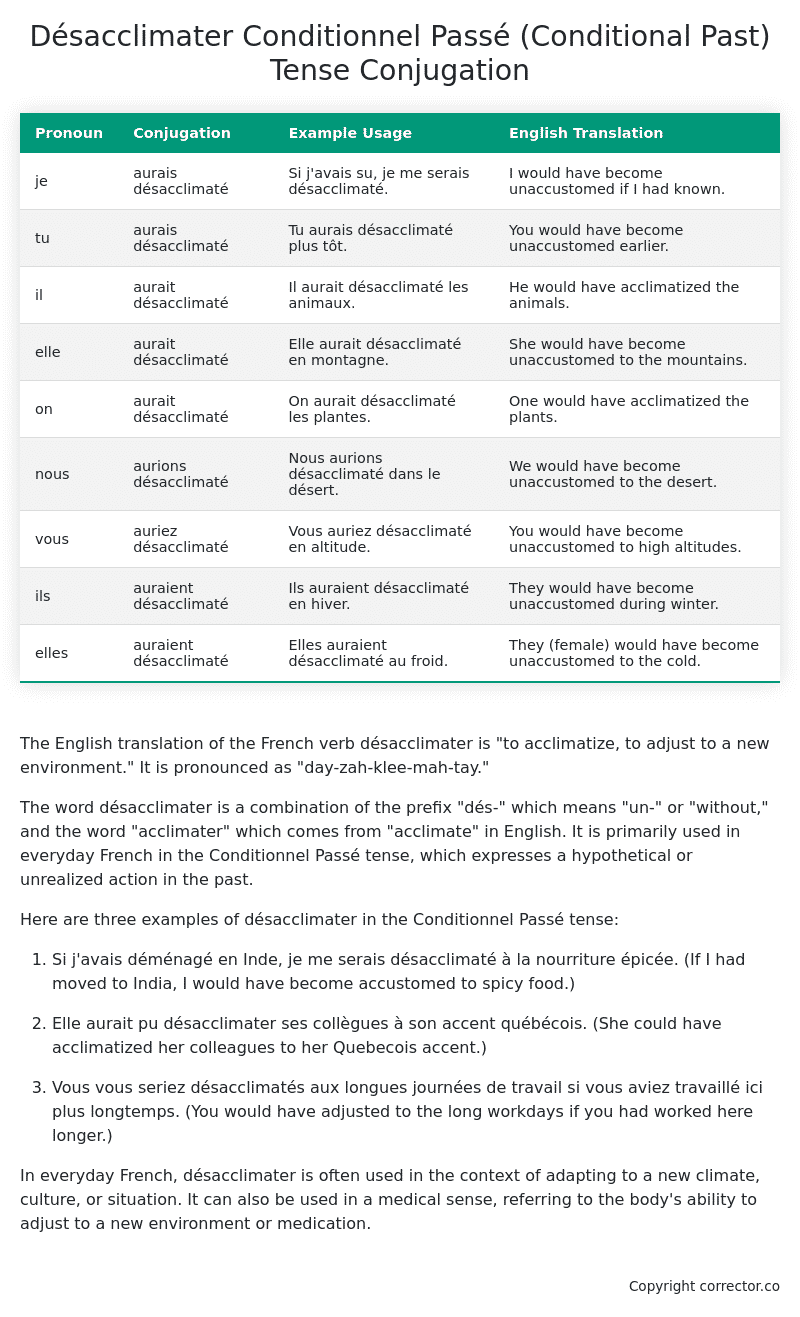Conditionnel Passé (Conditional Past) Tense Conjugation of the French Verb désacclimater
Introduction to the verb désacclimater
The English translation of the French verb désacclimater is “to acclimatize, to adjust to a new environment.” It is pronounced as “day-zah-klee-mah-tay.”
The word désacclimater is a combination of the prefix “dés-” which means “un-” or “without,” and the word “acclimater” which comes from “acclimate” in English. It is primarily used in everyday French in the Conditionnel Passé tense, which expresses a hypothetical or unrealized action in the past.
Here are three examples of désacclimater in the Conditionnel Passé tense:
-
Si j’avais déménagé en Inde, je me serais désacclimaté à la nourriture épicée. (If I had moved to India, I would have become accustomed to spicy food.)
-
Elle aurait pu désacclimater ses collègues à son accent québécois. (She could have acclimatized her colleagues to her Quebecois accent.)
-
Vous vous seriez désacclimatés aux longues journées de travail si vous aviez travaillé ici plus longtemps. (You would have adjusted to the long workdays if you had worked here longer.)
In everyday French, désacclimater is often used in the context of adapting to a new climate, culture, or situation. It can also be used in a medical sense, referring to the body’s ability to adjust to a new environment or medication.
Table of the Conditionnel Passé (Conditional Past) Tense Conjugation of désacclimater
| Pronoun | Conjugation | Example Usage | English Translation |
|---|---|---|---|
| je | aurais désacclimaté | Si j’avais su, je me serais désacclimaté. | I would have become unaccustomed if I had known. |
| tu | aurais désacclimaté | Tu aurais désacclimaté plus tôt. | You would have become unaccustomed earlier. |
| il | aurait désacclimaté | Il aurait désacclimaté les animaux. | He would have acclimatized the animals. |
| elle | aurait désacclimaté | Elle aurait désacclimaté en montagne. | She would have become unaccustomed to the mountains. |
| on | aurait désacclimaté | On aurait désacclimaté les plantes. | One would have acclimatized the plants. |
| nous | aurions désacclimaté | Nous aurions désacclimaté dans le désert. | We would have become unaccustomed to the desert. |
| vous | auriez désacclimaté | Vous auriez désacclimaté en altitude. | You would have become unaccustomed to high altitudes. |
| ils | auraient désacclimaté | Ils auraient désacclimaté en hiver. | They would have become unaccustomed during winter. |
| elles | auraient désacclimaté | Elles auraient désacclimaté au froid. | They (female) would have become unaccustomed to the cold. |
Other Conjugations for Désacclimater.
Le Present (Present Tense) Conjugation of the French Verb désacclimater
Imparfait (Imperfect) Tense Conjugation of the French Verb désacclimater
Passé Simple (Simple Past) Tense Conjugation of the French Verb désacclimater
Passé Composé (Present Perfect) Tense Conjugation of the French Verb désacclimater
Futur Simple (Simple Future) Tense Conjugation of the French Verb désacclimater
Futur Proche (Near Future) Tense Conjugation of the French Verb désacclimater
Plus-que-parfait (Pluperfect) Tense Conjugation of the French Verb désacclimater
Passé Antérieur (Past Anterior) Tense Conjugation of the French Verb désacclimater
Futur Antérieur (Future Anterior) Tense Conjugation of the French Verb désacclimater
Subjonctif Présent (Subjunctive Present) Tense Conjugation of the French Verb désacclimater
Subjonctif Passé (Subjunctive Past) Tense Conjugation of the French Verb désacclimater
Subjonctif Imparfait (Subjunctive Imperfect) Tense Conjugation of the French Verb désacclimater
Conditionnel Présent (Conditional Present) Tense Conjugation of the French Verb désacclimater
Conditionnel Passé (Conditional Past) Tense Conjugation of the French Verb désacclimater (this article)
L’impératif Présent (Imperative Present) Tense Conjugation of the French Verb désacclimater
L’infinitif Présent (Infinitive Present) Tense Conjugation of the French Verb désacclimater
Struggling with French verbs or the language in general? Why not use our free French Grammar Checker – no registration required!
Get a FREE Download Study Sheet of this Conjugation 🔥
Simply right click the image below, click “save image” and get your free reference for the désacclimater Conditionnel Passé tense conjugation!

Désacclimater – About the French Conditionnel Passé (Conditional Past) Tense
Formation
Common Everyday Usage Patterns
Expressing Unreal Past Scenarios
Polite Requests or Suggestions
Expressing Doubt or Uncertainty
Interactions with Other Tenses
Conditional Present
Indicative Past Tenses
Conditional Future
Summary
Want More?
I hope you enjoyed this article on the verb désacclimater. Still in a learning mood? Check out another TOTALLY random French verb conjugation!


